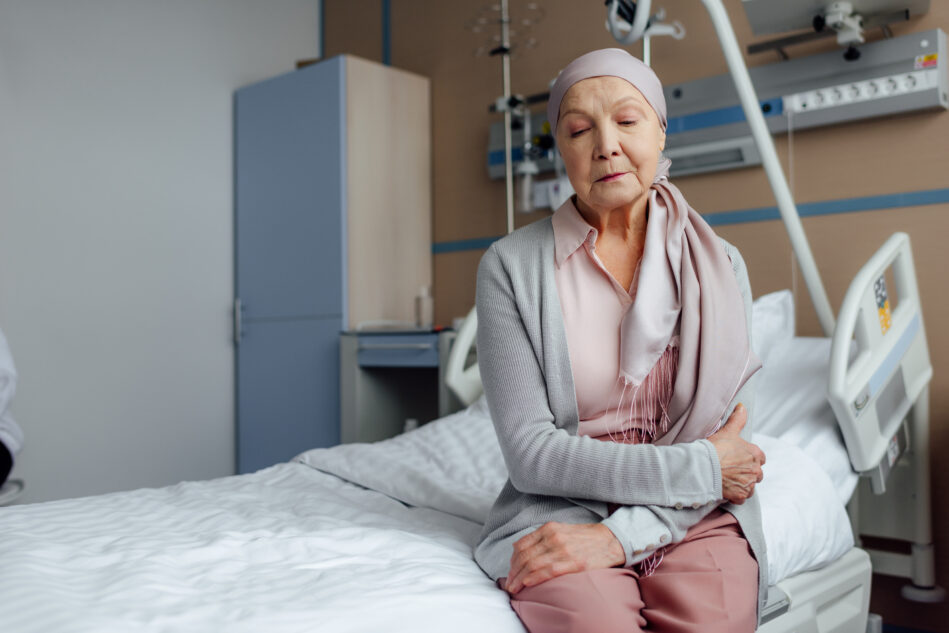May 26 Update: Only 62.6% of patients taking methotrexate, an immunosuppressant drug used in some cancer patients, mounted an effective antibody response to Pfizer’s vaccine, according to a study
Stephanie, a Stage 4 endometrial cancer patient who has undergone both chemotherapy and immunotherapy since 2019, has been especially cautious throughout the pandemic. “We know how deadly this virus is, especially for older people and those who are immunocompromised,” like herself, she says. “And if not lethal, the complications for Covid-19 survivors are severe.”
The jury is still out on how exactly the COVID-19 vaccine affects cancer patients. Yet some studies point to evidence that it’s better to get the jab sooner than later. With her oncologist’s encouragement, Stephanie got both doses of the Pfizer vaccine earlier this year, “my reaction to the drug was limited to mild, flulike symptoms after the second dose,” she says. “As a cancer patient, I will probably be mask-wearing and crowd-cautious forever, but I breathe easier having had the vaccine.” Clinical trials of the COVID-19 vaccines didn’t include enough patients with various types of cancers for the researchers to draw meaningful conclusions about the safety or efficacy for these patients. That means that, for now, all that scientists can say is that the vaccine is probably safe for these patients. Since we do know that patients with cancer are at heightened risk for severe outcomes from COVID-19, the risk involved in getting the vaccine is probably less than the risk of contracting the virus.
Plus, cancer patients may have one more reason to jump the line for a vaccine. A recent study suggested that new variants, like the B.1.1.7 that emerged in Britain, is believed to be more contagious and more deadly than previous forms of the disease and that it may have evolved inside immunocompromised patients.
“Because cancer patients are immunocompromised for a variety of reasons, either due to their underlying disease or due to receiving chemotherapy, having [a] COVID infection on top of their cancer increases their risk of having more serious outcomes compared to somebody who might otherwise have a normal immune system,” says Catherine Liu, MD, a vaccine and infectious disease researcher at the Fred Hutchinson Cancer Research Center.
Is It Safe?
An immunocompromised patient would be in danger from a vaccine if it carried a live virus. However, none of the vaccines for COVID-19 available in the U.S. use that strategy. The Moderna, Pfizer and Johnson & Johnson vaccines all deliver genetic material that directs your cells to produce a single protein found on the virus’ outside, not the entire virus. That protein is all your immune system needs to be able to recognize the virus. If the virus invades your body in the future your immune system will see that protein and know to fight the virus before it wreaks havoc on your body. Since that protein isn’t the full virus and can’t cause an infection on its own, researchers don’t believe the vaccine will be harmful to immunocompromised patients.
Rather than being immunocompromised like patients receiving chemotherapy or radiation, those being treated with immunotherapy may have a more robust immune response to the vaccine. Kevin Knopf, MD, MPH, an oncologist at Alameda Health System, suggests that that means the flulike symptoms many people experience after the shots might be more dramatic in these patients. “These [treatments] are amplifying the immune system,” he says. Still, those flulike symptoms will fade, and “we don’t have any qualms about getting these people vaccinated.” The National Comprehensive Cancer Network (NCCN) has released guidelines, regularly updated, regarding COVID-19 vaccination for cancer patients. The most recent version can be found here, under “COVID-19 Vaccination and Cancer Patients,” where the link reads “Download updated recommendations.”
For the most part, the experts suggest cancer patients should not only be vaccinated, but also prioritized to receive the vaccine as early as possible. However, the NCCN guidelines do list some special circumstances, particularly for those with hematologic malignancies, in which it may be best to postpone vaccination.
According to the guidelines, those undergoing intensive cytotoxic chemotherapy for blood cancers should wait until their white blood cell counts recover from the treatment. Patients receiving stem cell transplants or cell therapies should wait at least three months after treatment. Lastly, anyone having a major surgery for cancer treatment should aim to get the vaccine at least a few days before or after the procedure, rather than at the same time. These delays make sense because those therapies interfere with your immune system and may render the vaccination less effective.
“The data are limited,” said Liu. “But I don’t think there were any signals to suggest any sort of safety concerns that would be different from [the rest of the population].” Her sole concern was that there’s a chance the vaccines may be less protective for these patients than for patients with healthy immune systems.
Is It Effective?
At the start of the COVID-19 vaccine program, the Food and Drug Administration (FDA) determined that a vaccine with even a 50% efficacy would be a worthy tool in the fight against the virus. A year later, the U.S. has three vaccines that are far more protective: Moderna and Pfizer boast efficacy rates of about 95% after both doses, Johnson & Johnson reports a 66% to 72% efficacy and all have a 100% protection rate from hospitalization and death. If, however, you’re immunocompromised, that protection may be lower.
On March 15, researchers published a study in JAMA, showing that for patients who underwent solid-organ transplants (these patients typically take very strong immunosuppressant drugs), the efficacy of Pfizer’s and Moderna’s vaccines dropped dramatically. The researchers took blood tests after the patients received the first shot and found that only 17% had developed antibodies in response to the vaccine, meaning 83% of patients were likely left unprotected. Only 62.6% of patients taking methotrexate, an immunosuppressant drug used in some cancer patients, mounted an effective antibody response to Pfizer’s vaccine, according to a study published in May.
Still, experts say, any protection from the virus is better than none, and whenever possible, they encourage these patients to get vaccinated. Liu emphasizes that the data also reveal another crucial point. Since it’s unclear how effective the vaccine will be in patients who are immunocompromised, anyone who spends time around these patients, like caregivers and family, should get vaccinated. “Trying to protect the immediate circle around the patient is very important,” she says, “since cancer patients may not have as robust an immune response to the vaccine.”
Other Vaccine Considerations For Cancer Patients
Liu says that cancer patients should monitor themselves for side effects after the vaccination the same way most other patients do, paying attention to any immediate allergic reactions and taking over-the-counter painkillers for a few days to reduce any achiness and nausea. However, if you experience fevers, which are a relatively common side effect of the vaccines, you should call your doctor “to evaluate them and to determine whether [the fever] is vaccine-related or if it’s something else that may be related to the cancer treatment.” Patients undergoing chemotherapy, for instance, may be at higher risk for other infections that can cause fevers and would require treatment.
Another common side effect of concern to cancer patients or survivors is swollen lymph nodes. These tend to occur on the side of the body where you receive the vaccination. If you’re a breast cancer patient or survivor, swollen lymph nodes can signal that your cancer is spreading, so experts at cancer.org suggest getting the injection on the opposite side of your cancer to help differentiate the two symptoms. As a vaccine side effect, swollen lymph nodes may last several weeks and show up on mammograms. If you are planning to undergo routine screening, consider delaying it until at least six weeks after your vaccination. If the screening is required because of symptoms or to monitor an existing illness, then make sure to tell your doctor that you recently received a vaccine. You may need to undergo additional tests if the swelling shows up on your imaging.






